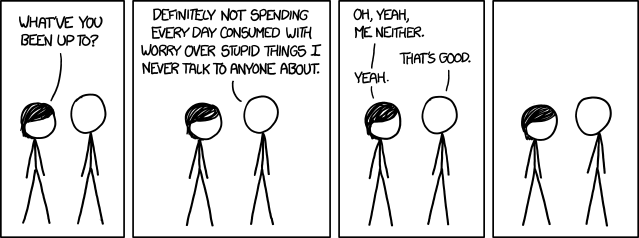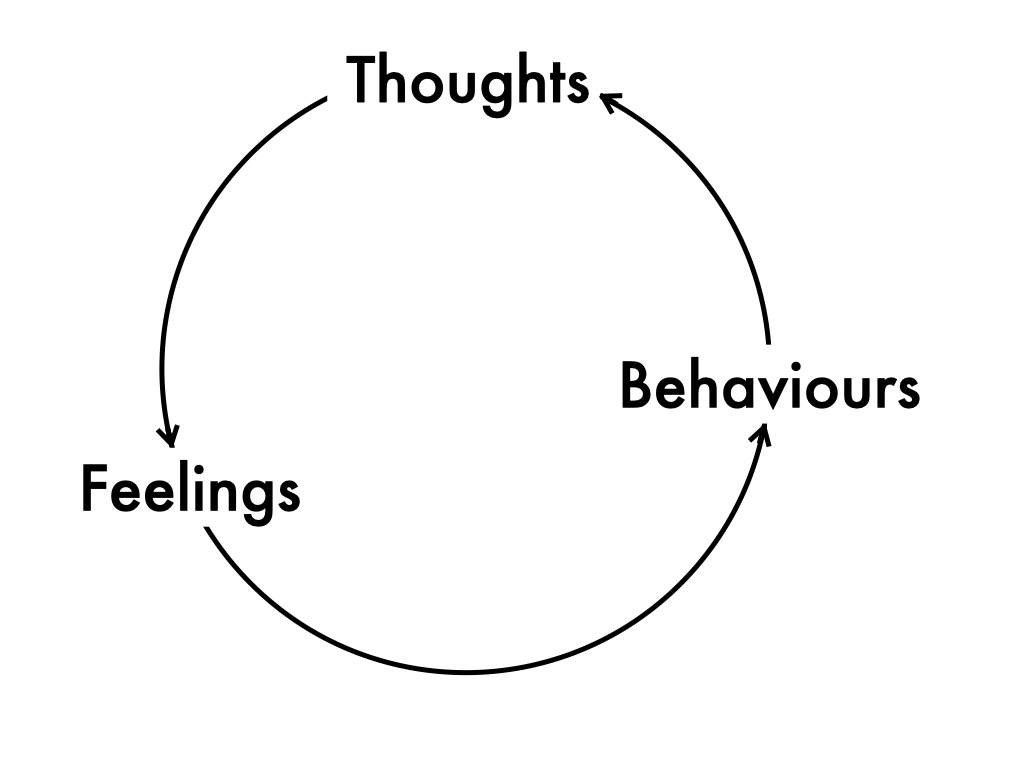This blogpost is about applying a mental-wellbeing coping to constant “data analysis worrying”.

From https://xkcd.com/1222/.
Let’s say you get a new project handed over; some kind of data analysis. What do you feel:
- excitement of getting your hands onto new data, or
- anxiety that this project may fail, stumbling upon all the data science mistakes that one can possibly make?
I feel both of these things. I am always delighted about a. because it means that I still like my work. But b. bothers me to no end, and so I decided to do something about it. Here is my write-up of my coping approach, split into two parts.
This Part 1 will discuss a mental coping approach, while Part 2 will show technical solutions that are available in R.
Data analytic challenges
There are tons of factors that will influence an analysis - whether controllable or not. Keeping these factors in check is often a challenge.
To give an example: Before actually seeing a dataset and without experience with that kind of data, we have little idea about the effort required to deliver an analysis.
Of course, with experience, analysts will develop a knack for foreseeing some of these troublesome factors and start to master them.
In the example above, we may ask for a sample dataset first before giving any delivery date; ask for more background information; any analysis previously done; that the dataset be sent in a specific data format, or for the power analysis that was done before the data was generated.
Such challenges are also highlighted in this RStudio Conf talk by Caitlin Hudon. Here, Caitlin Hudon talked about different categories of Data Science mistakes, one of them being “Technical / Analysis”, and then goes on to give a list of potential misunderstandings and mistakes. It’s a brilliant talk and I recommend watching it and taking notes of your mistakes (I do that with a simple text file).
Now, a little challenge is different from constant worrying. Constant worrying can come form real problems, say, “data QC will be a challenge”. But it can range up to a cognitive distortion, for example “this project will never end and be a total failure”.
Does experience really help?
Making mistakes and developing experience takes time and may also depend on work culture. Most importantly though, your self-confidence, “worry baseline” and core beliefs play a role1.
My point is, that instead of relying on years and years of experience, it may be quicker to apply what I call the “worry battling technique”.
“Worry battling technique”
This is borrowed from CBT - cognitive behavioral therapy - an intervention technique used to improve mental health. CBT techniques re-direct emotions and the resulting behaviour.

So that the cycle of Thoughts > Feelings > Behaviour > Thoughts > … becomes less vicious.
CBT also gives coping strategies to change cognitive distortions. You could say that worrying about the outcome of a data analysis after years of data analytic experience is a cognitive distortion.
De-catastrophizing
For myself, I have created a mix of several existing techniques around catastrophizing and anxious thoughts (borrowed from worksheets here and here) that work for me.
Whenever I feel anxiety creeping up, I go through the seven steps. It goes like this:
| Question to ask yourself | Example 1: Modelling | Example 2: Data QC |
|---|---|---|
| 1) What is something you are worried about? | I won’t find the right model for a given dataset. | I will overlook data cleaning traps (e.g. incorrect identification of missing values) |
| 2) What are some clues that your worry will not come true? | I have a solid education and it is not possible to find “the best model” anyway - it will always be an approximation and also depends on the time I have at hand. I have modeling validation techniques in place. I dedicate lots of time to talk to subject matter experts and collect background information. | I have data cleaning techniques in place. I have experienced lots of problems already - I am well prepared. Data cleaning is an iterative process; it’s ok to go back, correct the data cleaning process and rerun it. |
| 3) Worst possible outcome | Nothing fits, or the model does not converge. | Forth and back, running out of time to do any actual analysis. |
| 4) Best possible outcome | Perfect model. | Clean dataset. |
| 5) Likely outcome | I’ll find an ok model after some modelling iteration. | I’ll overlook a data cleaning aspect, but will fix it and rerun the data QC. |
| 6) If your worry does come true, how will you handle it? Will you eventually be okay? | I stick to a simpler model and suggest that someone else looks at it with fresh eyes. I will be ok. | I anticipate my worry and keep data cleaning separate from any analysis. This way I can rerun the data QC at any time again. I will be ok. |
Core beliefs
Another exercise is around core beliefs:
| Questions to ask yourself | Example 1 | Example 2 |
|---|---|---|
| What is one of your negative core beliefs? | No data analysis of mine was ever correct or has made a difference to science. | I am a slow data analyst. |
| List pieces of evidence contrary to your negative core belief. | I) Several of my data analyses have made it to manuscript or pipelines, II) People often tell me that they find my work helpful. | I am curious, quick to pick up new things and work hard. |
Why does it work?
I am not a psychologist, so I don’t know.
I guess for me it helps to know that there is a midway between the best and worst scenario, and that even if the worst happens, the world won’t fall apart.
Summary
Some people have a tendency to anxiety. Such anxiety may cause unrealistic catastrophizing of a data analysis. This in turn can create an unhealthy nervousness and simply exhaust.
Whenever faced with a “
These sets of questions help me and I hope they help you as well.
Part 2
In part 2 I will discuss more technical solutions, e.g. project set up, QC tooling in R or how important it is to take breaks.
One could also argue that this is simply impostor syndrome.↩